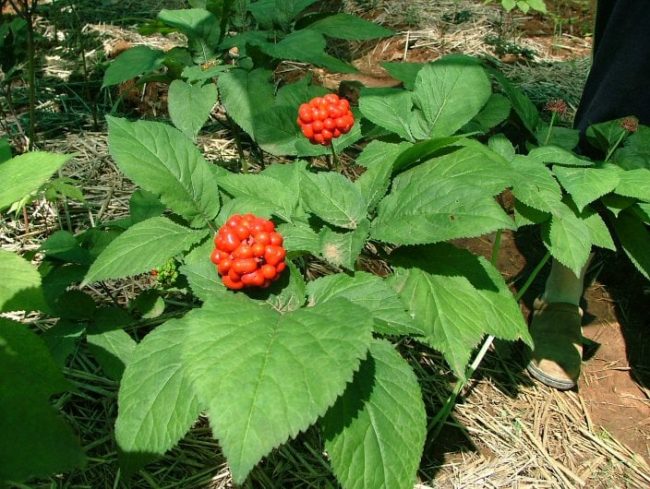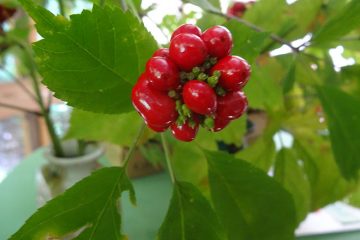
Robert Eidus addressed the North Carolina Plant Conservation Board about banning the export of wild ginseng from North Carolina, and licensing and educating harvesters.
January 11, 2022, Chapel Hill Arboretum, Chapel Hill, NC
Good afternoon, my name is Robert Eidus. I have been a North Carolina Ginseng Dealer, and have a North Carolina nursery license, continuously since 1994. I believe I have a unique perspective on American ginseng (Panax quinquefolius), which, in my opinion, is in big trouble because of not only habitat loss and over harvesting, but uneducated out-of-season harvesting which has brought the poundage on a downward spiral.
It is my intention to show the Board and Scientific Committee that this is a man-made crisis and one that can be reversed to bring back the populations of this unique and rare plant.
Resource exploitation is not new to this planet and is one of the reasons the world got together in the late 1970s to pass the CITES treaty, with this plant on the first list of species that needed help. It is my reading of the treaty that those countries signing would put in rules and regulations that would maintain the plant’s numbers, and likewise protect its habitat. To date there is only the record of plants exported.
It would seem, from the raw numbers of pounds exported, that American ginseng’s plant numbers and habitat are troublesome. Two problems are the lack of a program to reseed or replant ginseng, and a new procedure to identify and educate the harvesters.
American ginseng has been exported to China since the 1780’s with an average of 315,000 pounds each year, or approximately 12,600,000 plants dug each year (with a pound consisting of 400 10year old plants). This is about 300 plus years or 4 trillion plants harvested, to throw out a number. We as humans can not keep taking this plant and not putting it back without dire consequences. It should be noted that before Europeans started exporting this plant it was considered a forest weed. It is not that the US government in the recent past has not given away seedlings to the public and nurseries over the years.
Is there any precedent about suspending the selling and export of wild ginseng across state lines? Since the mid 1990s, both Michigan and Maine have had a ban on exporting wild ginseng from their states.
There is also precedent when China and the US were not on the best of terms and American ginseng was banned from going to China. This could be (1) a political decision, like being on opposite sides in a war, to (2) economic decisions, especially the recent last round of tariffs in the past administration, or (3) during the Civil War when all exports stayed or were stored in the US.
So, states have banned the export of wild American ginseng across their state lines and the US has had periods in the past when export was stopped to China. The point is, whenever the export trade was halted or cut back it allowed the plant to come back in numbers and increased sustainable habitat, even if this was a collateral response.
Therefore, in my opinion, for conservation purposes, a temporary export ban could help the wild species return, as well as creating a new opportunity for NC ginseng forest farmers and nurseries to grow this crop in an organic wild-stimulated forest farming way for North Carolina residents, and an out-of-state attraction for the tourist industry.
However, if a temporary state ban is in effect for wild pouched ginseng, there is still a problem in the system that I believe needs fixing. Education of harvesters and the detrimental consequences to conservation must become forefront to NCDA. When the Covid virus was with us in 2020, I had two visits that year from young unemployed men both in early September. Both had large boxes with hundreds of ginseng roots. There was no way they could have harvested in season. On top of that, they did not know how to clean or dry the roots, so the roots started to mold out. There were hundreds of roots in each and the majority were under 5 years old or washed incorrectly. I obviously would not buy them and believe they were sent to the landfill.
In 2008, the Plant Division staff recommended to the Board (under Cecil Frost) to create a $10 Harvesting fee. This part of the meeting was never brought up or discussed. If there is a harvesting fee, then NCDA education can happen before the harvesters begin poaching out-of-season and not getting the education needed. Right now, education occurs mainly when they bring their roots to the dealer after it is too late. A ginseng harvesting fee has been established in Wisconsin, Illinois, and Maryland. It has been the USFWS’s suggestion to initiate a harvesting fee since 2008.
But the real reason for me to be allowed to talk about a state export ban and licensing of the harvesters, was the ban on harvesting in the National Forests in NC this year. The ban was reinforced in other states recently to include TN, KY, and GA, with VA in its 5 or 6th year, and Arkansas Ozark Forest since the 1990’s. I have been directed to, and recommended a Forest Service report by forest economist Frey Gregory in 2018. Thus the assessment by Gary Kauffman, in my opinion, was a wake-up call for the American ginseng plant in NC, which joined the harvest ban in other Southern Appalachian Mountain state’s National Forests.
In summary, creating a temporary export ban on wild American ginseng in NC will allow for the slow rise in plant species survival. Additional humans can help by allowing for the stratification of the ginseng seed. If a plant drops a seed there is 1% chance for germination. If we want to help this germination rate, good harvesters plant the red berries around 2 cm deep, plus a foot and a half from the plant. If this is done, there will be a 16% germination rate. However, if humans stratify the seed from fall to fall, the germination rate goes up to 90 plus %.
Creating a license for the harvesters is one of the best and easiest ways to conserve this plant. And, like the Forest Service limiting the number of pounds harvested for the season, should help with some of the out-of-season harvesting.
As a dealer, when someone has over ten pounds (approximately 4,000 plants) and swears it was off his own land, you know this is a questionable sale. They usually say the dig was legal, but when they then bring you 10 or more dried pounds right after the 15th of September and swear it was all in season, as a dealer you know they are lying. When you ask how they dried it, they will say air dried, but there is no way that can happen by mid September.
Most Ginseng Dealers will not publicly admit to participation in America’s last legally sanctioned illegal activity, the poaching of American ginseng, (which has been estimated at 85% of the wild crop). And, who is the main beneficiary? The Hong Kong Chinese, whose business model is to have their American harvesters poaching (approximately 95% of the yearly export documented) of America’s most important herb.
As one dealer stated to me, “By removing the existing trade from our forest to China, we would also help with the opioid and crack cocaine crisis.” Many harvesters are poaching to pay for illegal drugs. With harvester licensing and education, this could remove the stealing mentality from this industry and will go a long way for conservation of this plant.






